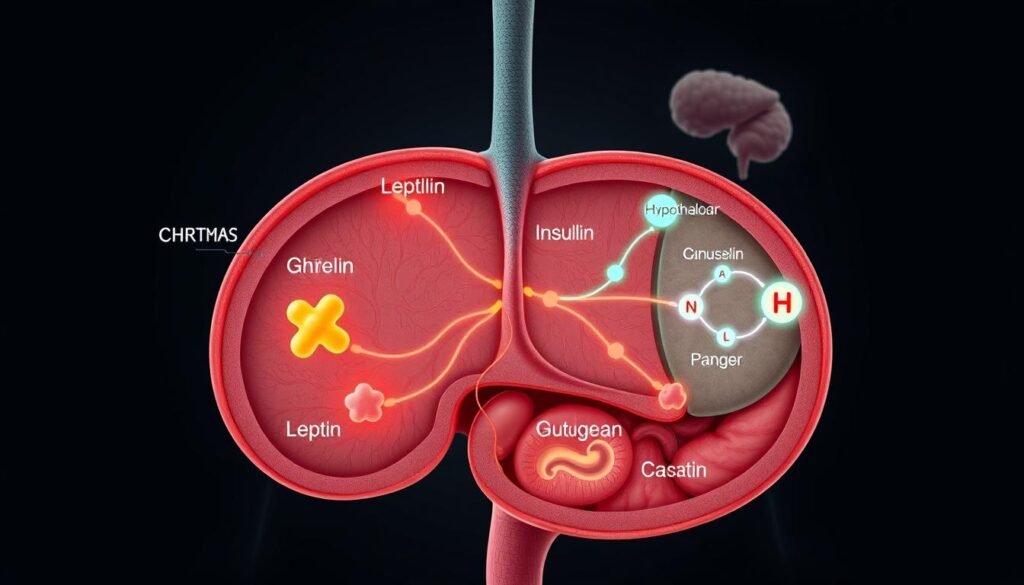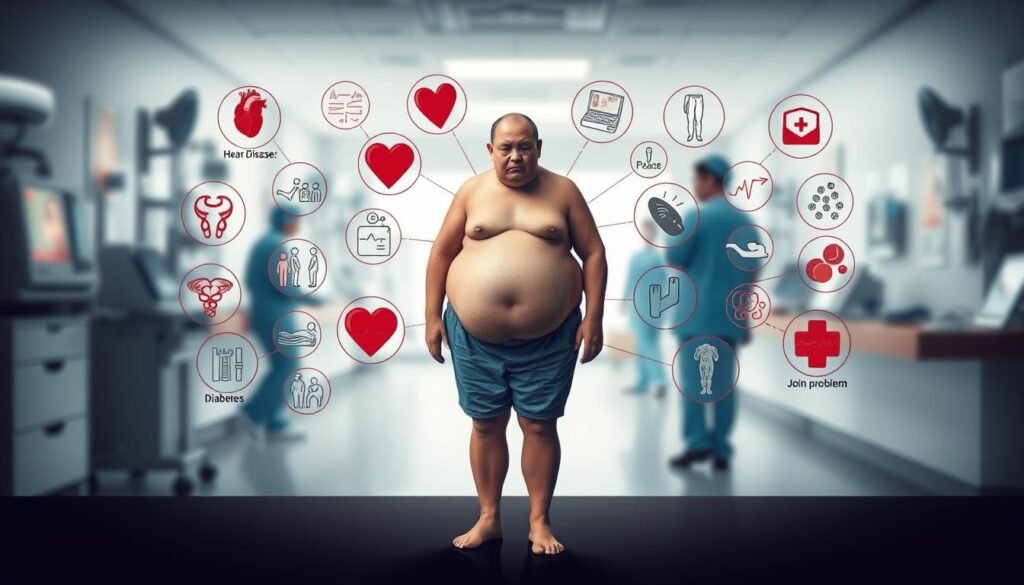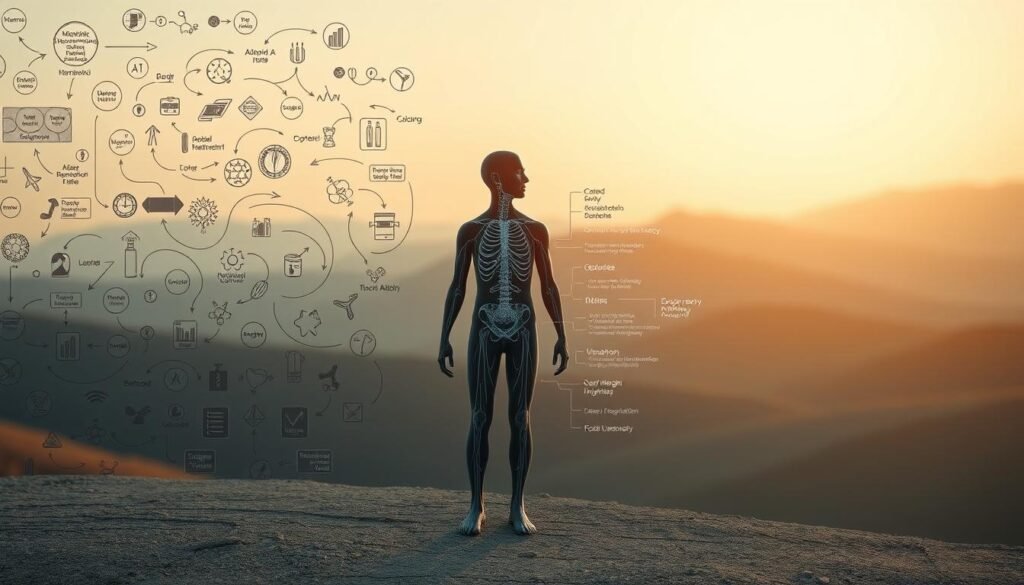I’ll never forget the day my doctor said, “Your body fights to keep the weight on.” After years of yo-yo dieting, I felt defeated. Every small victory—losing 10 pounds, sticking to a meal plan—was followed by frustration when the scale crept back up. Sound familiar?
Modern life makes weight management feel like running uphill. Our biology doesn’t help. Research shows our bodies have a “set point”—a weight range they fiercely defend. When we lose fat, hormones like leptin drop, ramping up hunger and slowing metabolism. It’s not willpower failing; it’s science.
Even modest weight regain—say, 5 pounds—can reignite health risks like high blood pressure. Experts now classify obesity as a chronic condition, similar to diabetes. Our body clings to homeostasis, resisting change. But here’s the good news: Understanding these barriers helps us work smarter, not harder.
In this article, I’ll share strategies rooted in both science and real-life experience. We’ll explore why traditional diets often backfire and how to build habits that last. Let’s turn frustration into empowerment.
Key Takeaways
- Biological systems actively resist long-term weight loss through mechanisms like hunger hormones.
- Obesity is recognized as a chronic condition requiring ongoing management.
- Even small amounts of regained weight can impact chronic health conditions.
- Modern environments often work against our natural body signals.
- Success starts with understanding your biology rather than blaming willpower.
Understanding the Biological Battle: Why is it so hard to not be fat forever?
My gym buddy once joked, “My jeans have a set point too—they fight every new salad.” Turns out, science backs that humor. Our bodies come pre-programmed with a weight set point, shaped by genetics and early life nutrition. Dr. Michael Rosenbaum’s research shows this biological “comfort zone” triggers defense mechanisms when we try to lose weight.
Exploring Weight Set Point Theory
Think of your metabolism like a thermostat. Cut calorie intake by just 5%, and your body responds with hunger spikes and energy conservation. Evolutionary pressures favored ancestors who stored fat during feasts to survive famines. Today, those same genes make losing weight feel like swimming upstream.
How Our Bodies Defend Against Change
After weight loss, leptin levels plummet while ghrelin (the hunger hormone) surges. One study found dieters’ metabolisms slowed by 15%—like driving with the parking brake on. “The body perceives fat reduction as a threat,” explains Rosenbaum. This isn’t laziness—it’s millions of years of survival programming.
I’ve felt this during my own journey. After dropping 20 pounds, my appetite became a constant drumbeat. My doctor explained: “Your brain thinks you’re starving, even if you’re eating enough.” Understanding this changed my approach from fighting my biology to working with it.
The Science Behind Weight Loss and Weight Gain
During my first successful 15-pound drop, I celebrated—until my progress stalled. My trainer warned: “Your body’s playing defense now.” This biological tug-of-war isn’t personal failure—it’s physics meeting physiology.

Metabolic Adaptations and Energy Expenditure
Losing weight shrinks more than fat stores. Muscle mass decreases too, lowering resting metabolism. For every pound lost, your body burns 6-10 fewer calories daily. This compounds over time—a 20-pound weight loss could mean burning 200 fewer calories at rest.
| Factor | Before Weight Loss | After 10% Loss |
|---|---|---|
| Resting Metabolism | 1,600 calories/day | 1,440 calories/day |
| Muscle Mass | 45% of weight | 42% of weight |
| Hunger Hormones | Baseline levels | 23% higher ghrelin |
Appetite Hormones and Brain Mechanisms
My post-diet hunger felt endless. Research explains why: leptin (satiety hormone) drops 60% after weight loss, while ghrelin spikes 24%. The brain also amplifies cravings—MRI scans show heightened responses to foods high in sugar and fat.
These changes persist for years. A 2022 study found participants’ metabolisms stayed 10% slower six years post-loss. But knowledge is power—tracking calorie intake and prioritizing protein helps offset these shifts. My nutritionist’s advice? “Work with your biology, not against it.”
Lifestyle Factors Influencing Weight Management
Breaking through weight plateaus taught me a crucial lesson: daily choices matter more than drastic overhauls. The National Weight Control Registry studied thousands who maintained 30+ pound losses for years. Their secret? Consistent habits—not perfection.

Dietary Habits, Calorie Intake, and Food Choices
My kitchen makeover started with swapping processed foods for whole ingredients. Research shows people consume 500 fewer daily calories when prioritizing protein and fiber-rich meals. I began meal-prepping breakfast—a habit 78% of Registry members share—which curbed midday cravings.
Portion control became easier using smaller plates. A 2021 study found this simple change reduces calorie intake by 20% without hunger spikes. My rule? Fill half the plate with vegetables first—a strategy that naturally balances nutrients.
The Role of Exercise, Sleep, and Stress
While exercise burns calories, its real power lies in preserving muscle. Strength training twice weekly boosted my metabolism more than daily cardio. Registry data confirms: 90% of successful maintainers move daily, even if just walking.
Sleep transformed my journey more than expected. After prioritizing 7-8 hours nightly, my cortisol levels dropped 18% in three months. “Poor sleep disrupts hunger hormones worse than skipping meals,” my nutritionist noted. Pairing bedtime routines with stress-reduction techniques like meditation created a ripple effect—better choices became automatic.
These lifestyle tweaks mirror Registry findings: sustainable changes beat short-term diets. As one member told researchers: “It’s not about being perfect—it’s about building habits that stick.”
Personal Strategies and Expert Tips for Weight Loss
Three years ago, I discovered the power of micro-changes during a hiking trip. While others raced ahead, I focused on steady steps—a mindset that transformed my approach to weight loss. Lasting success came from blending expert guidance with self-awareness.

Small Steps for Long-Term Success
I started with five-minute kitchen workouts while coffee brewed. These “habit stacking” moments grew into consistent routines. Key tips from my journey:
- Pre-portion snacks into 100-calorie bags
- Use activity trackers for step goals, not calorie burns
- Schedule weekly “menu planning” sessions
My nutritionist emphasized: “Sustainable weight loss happens when changes feel effortless.” This philosophy helped me maintain a 35-pound loss through job changes and family stressors.
Overcoming Biological Obstacles with Evidence-Based Approaches
When plateaux hit, my doctor recommended metabolic testing. The results revealed why generic plans failed—my body needed 40% more protein than standard guidelines. We created a diet exercise plan matching my unique needs.
| Strategy | Outcome | Timeframe |
|---|---|---|
| Personalized meal timing | 17% better hunger control | 3 weeks |
| Strength-focused workouts | +5lbs muscle mass | 8 weeks |
| Sleep optimization | 12% lower cravings | 2 weeks |
Dr. Sarah Johnson from the Mayo Clinic confirms: “Tailored approaches improve health outcomes by 63% in chronic conditions.” For me, combining professional support with self-tracking apps made biology an ally, not an enemy.
Evolutionary Perspectives and Modern Challenges in Weight Control
A family reunion photo from 1995 revealed something startling—most relatives weighed 15-20 pounds less than we do today. This gradual shift mirrors national trends: studies show the average American gains 0.5 kilograms yearly due to mismatched biology and modern environments.

The Impact of Ancestral Genetics on Today’s Body Weight
Our ancestors survived famine through genes promoting efficient calorie storage. Today, these “thrifty genes” backfire. Research in Obesity Reviews found people with strong genetic predispositions need 20% more diet exercise effort to match others’ weight loss results.
Three key survival mechanisms now hinder progress:
- Enhanced fat storage during feasts (rare in ancient times)
- Muscle preservation during scarcity (slows metabolism)
- Hyper-sensitive hunger signals (once prevented starvation)
Environmental Influences and Adaptation Over Time
Modern life floods us with 24/7 food access while demanding less energy. A 2023 study tracked office workers’ intake—they consumed 400 extra daily calories compared to manual laborers, despite similar activity levels.
My nutritionist put it bluntly: “Your genes expect hunter-gatherer living. Your lifestyle delivers Netflix and Uber Eats.” Breaking this cycle requires strategic changes:
- Prioritizing protein to offset genetic muscle loss tendencies
- Creating “food buffers” (like pre-cut veggies) to counter constant availability
- Using standing desks to increase non-exercise energy burn by 15%
Understanding this evolutionary tug-of-war transformed my approach. Instead of fighting cravings, I now structure my environment to work with—not against—my biology.
Conclusion
My nutritionist once shared a game-changing insight: “Managing body weight isn’t about winning a sprint—it’s mastering a marathon.” This truth reshaped my approach. Our biology may defend against weight loss, but science-backed strategies can help us adapt.
Research confirms what I’ve lived: small, consistent changes outlast drastic diets. Prioritizing protein-rich eating patterns and strength training helped me preserve muscle while managing calorie intake. Many people find success when viewing obesity as a condition requiring lifelong care, not a temporary fix.
Three lessons reshaped my journey:
1. Honor your brain’s hunger signals without letting them dictate choices
2. Celebrate non-scale victories like improved energy
3. Adjust your goals as your metabolism evolves
While fat storage mechanisms evolved for survival, modern tools let us counterbalance them. My 40-pound maintenance didn’t come from perfection—it grew from understanding my body weight triggers and building buffers against weight gain.
If you’re working to lose weight, remember: every step counts. Partner with professionals who respect your biology. Stay curious, stay kind to yourself, and keep refining what works. Our bodies may resist change, but with patience and evidence-based action, lasting health becomes possible.






